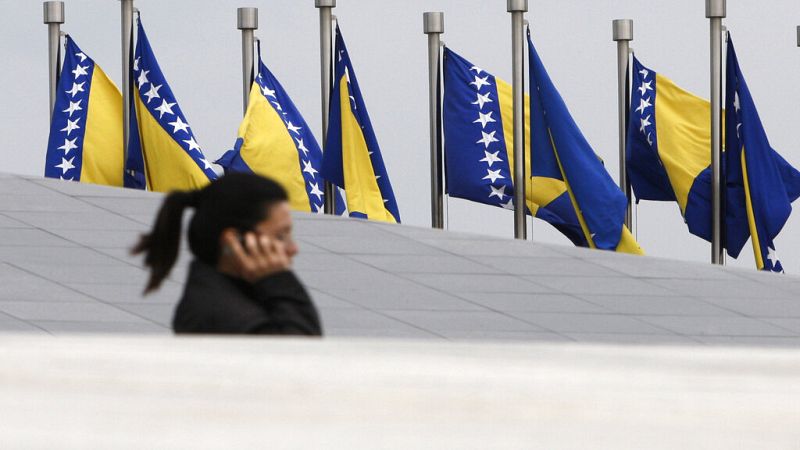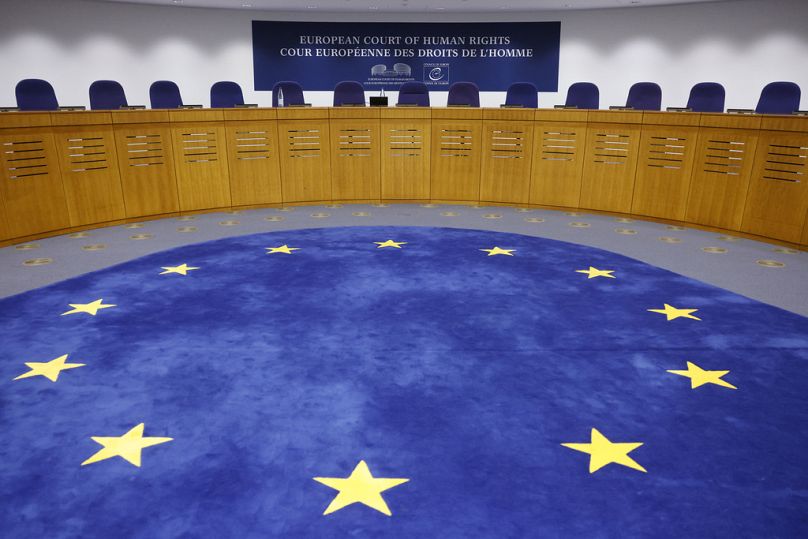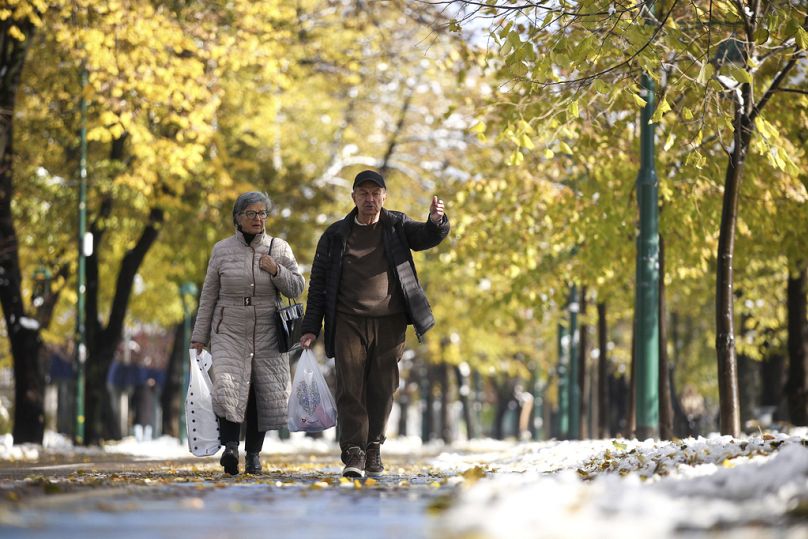Bosnian citizen's legal battle exposes ethnic voting rights issue in Human Rights Court

As the six Western Balkan nations strive to join the European Union and pursue reforms laid out in a €6-billion EU growth plan, Bosnia and Herzegovina finds itself distracted by a landmark civil rights case that could upend its ethnic power-sharing system.
Last year, the European Court of Human Rights (ECtHR) ruled in favour of a complaint by Bosnian dignitary Slaven Kovačević against the Balkan country and said that its constitution violates human rights by “rendering ethnic representation more relevant than political, economic, social, philosophical and other considerations”.
Bosnia appealed the ruling, and the hearing took place in Strasbourg last week.
Could the verdict, which is not expected until 2025, ultimately spell the end of Bosnia’s tripartite presidency and institutions and act as a catalyst for the country’s EU accession talks?
Why Kovačević’s legal case is a political matter
Slaven Kovačević is a political scientist and an advisor to Željko Komšić, the Bosnian Croat member of the country's threeway presidency. Komšić is the head of the Democratic Front, a multi-ethnic liberal party that aims to abolish the barriers between the country’s peoples.
Kovačević’s legal complaint to the ECtHR said that he was constitutionally prevented from voting for the candidates of his choice in the 2022 general elections “due to a combination of the territorial and ethnic requirements.”
The ECtHR ruled that the “discriminatory treatment” of Kovačević was in breach of the European Convention on Human Rights, the sixth time since 2009 that the court has judged Bosnia’s constitution and election laws to have violated the global human rights treaty.
“I am clearly a victim of the provisions of the Bosnian constitution,” Kovačević told the court last week. “These provisions limit my active voting rights exclusively to ethnically suitable candidates while my desire is to vote for candidates regardless of their ethnicity”.
The case revolves around the state structure of Bosnia that has existed since the 1995 Dayton peace treaty. It ended nearly four years of conflict among Bosnian Serbs, Croats and Bosniaks by splitting the nation along ethnic lines into two main administrative units - the Serb-dominated Republika Srpska (RS) and the Bosniak and Croat-majority Federation of BiH, or FBiH).
Bosnia’s constitution — an annex of the Dayton treaty — is an unusual hybrid legal text lodged between constitutional and international laws. It was crafted by the US and European powers and dictated by the urgency of stopping the conflict in the former Yugoslav nation, after violence escalated to a genocide in Srebrenica in July 1995.
The Dayton treaty aimed to achieve stability among communities through a complex constitutional construction. Thus, Bosnia’s constitution distinguishes between “constituent peoples” — Bosniaks, Croats and Serbs — and “others”, such as members of minorities or Bosnians, people who do not declare an affiliation with a particular ethnic group, such as Slaven Kovačević.
The ECtHR’s ruling last year in Kovačević’s favour triggered yet another political and institutional debate about the Bosnian constitution, and previous failed attempts to reform it.
Can't we all just get along?
At the centre of the discussion lies the heavily ethnicised political system, deemed to be one of the most complicated and complex in the world.
Adnan Huskić, a political scientist and an academic from the University of Sarajevo, told Euronews: “Yes, the discrimination is there. But is it the role of the European Court of Human Rights in Strasbourg to basically disassemble the peace treaty, which was designed to accommodate all these differences in a stable environment?”
“It endangers the stability of Bosnia and Herzegovina politically,” he added. “Once we start unwrapping this, we don't know where we're going to end.”
The alleged discrimination resulting from the constitution established by the Dayton accord is a longstanding issue, and other Bosnian citizens who identify as “others” have filed cases similar to Kovačević’s at the ECtHR.
“As early as 2000, the Constitutional Court of Bosnia and Herzegovina concluded that the Dayton constitution is discriminating against many citizens with regard to a number of fundamental rights and freedoms, and gives unacceptable benefits to the constituent peoples,” Nedim Ademović, a constitutional expert and lawyer, told Euronews.
However, Bosnia’s Constitutional Court has confirmed that it does not have the mandate to change the country’s constitution despite this reality.
“Even the European Court of Human Rights concluded that these unacceptable privileges of members of the constituent peoples were justified by the priority of ensuring peace in Bosnia and Herzegovina” Ademović added.
In similar cases concerning other constitutional provisions — such as the Sejdić and Finci case, where the applicants complained about their ineligibility for office because of their respective Roma and Jewish origins — the ECtHR and the Council of Europe have said that Bosnia should adapt its constitution to “superior international standards”.
Is ethnicity a matter of choice?
In theory, Bosnia’s constitution does not allow for any such discrimination.
“The rights and freedoms set forth in the European Convention of Human Rights … shall apply directly in Bosnia and Herzegovina,” the constitution says. “These shall have priority over all other law.”
Yet, when it comes to voting rights, the reality in Bosnia is very different.
“The Kovačević case concerns the active right to vote in elections,” said Ademović. “In essence, it concerns the right that all citizens could vote for all candidates for state institutions regardless of their ethnic origin, which the constitution now restricts.”
This is due to strict rules around power sharing in Bosnia’s state institutions at all levels — from local administration to the highest levels of government and the presidency itself.
The top chamber of the state-level parliamentary assembly is composed of five Bosniaks and five Croats, who hail from the FBiH, and five Serbs from the RS.
The tripartite presidency has one member from each of the three main ethnic groups, but no representatives of others.
The issue at the heart of the discrimination allegations is that only representatives from the Bosniak, Croat and Serb ethnic groups can become candidates for these institutions, something that those in favour of ethnonational divisions reject as a matter of choice.
Monika Mijić, a Bosnian state lawyer who represented the government in its appeal at ECtHR, defended the political raison d’être of the current power-sharing arrangement and voting rights.
Mijić told the ECtHR that ethnic affiliation in Bosnia “is not an objective category”, meaning that a Bosnian citizen can choose which ethnic group they identify with and change this whenever they wish. It is a “subjective category” that means freedom of choice, she argued.
However, Huskić of the University of Sarajevo said that the argument was flawed.
“What she is basically saying is, if you are a majority, then you can establish yourself as an absolute majority by simply faking the mixture of ethnicities. So, she says, (let’s have) fake Croat ministers in the Republika Srpska, fake Serb ministers in the Federation,” Huskić said.
Yesterday



